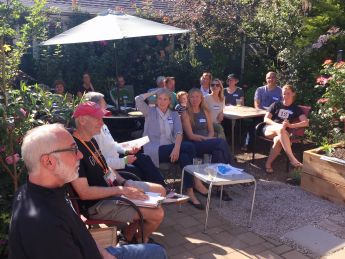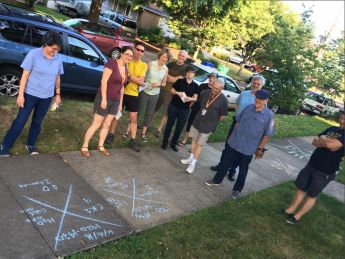Affiliated Team Volunteers (ATVs)
Policy Summary: Affiliated Team Volunteers

An Affiliated Team Volunteer ("ATV") is a volunteer who associates with and is assigned to a Neighborhood Emergency Team (NET) and is background checked, but does not possess full "Active" NET volunteer status. They are not deployed or indemnified by the City of Portland. They have a profile in the NET volunteer database, and may participate in non-deployment team activities with active NET volunteers.
| Effective date | March 25, 2024 |
| Last revised | March 1, 2025 |
| Policy owner | PBEM Community Preparedness Team |
| Author(s) | Jeremy Van Keuren (PBEM); David Given (NET); Kay Hilt (NET). |
Forms
| Relevant Forms | Updated |
|---|---|
| PBEM Volunteer Application |

Reason for Policy
The Affiliated Team Volunteer (ATV) program supports Neighborhood Emergency Teams (NET) by fostering neighborhood resilience and preparedness while addressing these needs:
- Facilitating denser neighborhood social networks for NET teams.
- Building relationships with neighbors who may become spontaneous volunteers (SUVs) in the immediate aftermath of a disaster.
- Providing a transitional status for active NET volunteers who wish to scale down their involvement without leaving the program entirely.
- Volunteer managers are assured that ATVs who respond with a current ID have been background checked by PBEM and have at least one specific, deployable skill. This is in contrast to SUVs, who are not vetted before they arrive and offer to help, and must be interviewed to determine their most appropriate placement.
Policy Statement
Affiliated Team Volunteers (ATVs) are community members who support NET teams in their local areas but do not hold full "Active NET" status. ATVs are envisioned as supplemental resources for their NET's earthquake response framework and as contributors to overall community resilience. Although they are not deployed by the City of Portland nor indemnified, ATVs may participate in preparedness efforts to strengthen neighborhood readiness for emergencies and to improve general resilience, and in some training and other team activities.
Scope
This policy applies to:
- NET volunteers transitioning to a reduced role as an ATV.
- Community members who wish to assist NET teams without completing Basic NET training.
- Neighborhood Emergency Teams and Team Leaders coordinating earthquake response.
Responsibilities
- Portland Bureau of Emergency Management (PBEM)
- Tracks ATVs in the volunteer database, ensures background checks, and communicates program updates.
- Team Leaders
- Maintain roster accuracy, guide ATVs in selecting Volunteer Support Functions (VSFs), and provide team orientations.
- Affiliated Team Volunteers (ATVs)
- Engage with their NET as outlined in this policy, adhere to the Code of Conduct, choose a VSF, and confirm status biannually.
Definitions
| Term | Definition |
|---|---|
| Affiliated Team Volunteer (ATV) | A volunteer who supports a NET team but does not hold full "Active NET" status. |
| Neighborhood Emergency Team (NET) | A community-based group of volunteer disaster responders whose members are trained and certified by the Portland Bureau of Emergency Management. |
| Spontaneous Unaffiliated Volunteer (SUV) | People who help in disaster response/recovery without being part of a disaster relief organization. They often show up after a disaster, and they may not have formal training. |
| Volunteer Support Function (VSF) | A defined disaster preparedness, response, or recovery role based on skills and interests. |
Implementation Details
Access and General Expectations of ATVs
- ATVs are not indemnified by the City of Portland and are not officially deployed by the City.
- ATVs must adhere to the PBEM Volunteer Code of Conduct.
- ATVs are tracked in the PBEM volunteer database.
- ATVs must affiliate with a specific NET and appear on their team roster.
- ATVs are encouraged but not required to log volunteer hours and attend NET team meetings.
- ATVs must confirm their status (check in) with their Team Leader a minimum of twice annually. This can be done in as simple a method as sending the Team Leader an email to confirm they are still part of the team.
- ATVs declare a primary VSF and may declare a secondary role, with Team Leader approval.
- ATVs may access select advanced NET trainings if seats are available.
- ATVs are not issued NET personal protective equipment (PPE).
- ATVs are issued PBEM photo ID volunteer ID cards, similar to NET ID cards.
ATV Intake Procedure
For former Active NET volunteers
- Inform the Team Leader of your intention to transition to ATV status and declare a VSF.
- Notify PBEM via email (net@portlandoregon.gov) for database updates.
- NET volunteers downshifting to ATV status may keep their NET-issued PPE (hard hat and vest).
- NET volunteers downshifting to ATV status do not need a revised ATV ID card until their NET ID card expires.
For non-NET certified neighbors:
- Confirm with the local Team Leader your interest in joining the roster and declare a VSF. The Team Leader must give their approval.
- Complete the online NET application (HERE).
- ATV applicants complete the NET application just as they would do if they were applying to NET.
- After the application is completed, the ATV informs their Team Leader the application is ready.
- The Team Leader reports the completed application to PBEM staff and ask to have the volunteer moved from "Applicant" to "ATV" status, and their assigned VSF(s).
- Undergo a criminal background check at no expense to the volunteer. The volunteer will receive an email from PBEM with additional information.
- Complete orientation to the team with the Team Leader. Orientation should include:
- a. How to log volunteer hours;
- b. The NET's earthquake response framework and the ATV's role in it;
- c. Team meeting schedule;
- d. How to receive further training on their VSF of choice.
- The ATV is issued and mailed an ATV ID card from PBEM.
Compliance
ATVs who do not respond to Team Leader communications may be removed from the roster and PBEM database. Volunteers who violate this policy or the Code of Conduct may face dismissal from the program.
Related Information
Frequently Asked Questions (FAQs)
Q: How will ATVs be distinguished from SUVs in an activation?
A: ATVs are issued PBEM volunteer photo ID card, similar to NET ID cards. No SUV will have a valid PBEM-issued ID.
Q: What roles/VSFs are suitable for ATVs?
A: Roles with "No" in the "NET/CERT req?" column of the VSF Directory are appropriate for ATVs. Training requirements apply.
Q: How long may an ATV serve?
A: Just like NET volunteers, there is no limit on service. Every volunteer's background check and ID card must be renewed every three years.
Program/Policy Background
"ATV" was first coined and suggested to Jeremy Van Keuren (PBEM) by NET volunteer David Given in July 2017. David worked with Boy Scout volunteers and requested a volunteer status that kept a non-NET disaster response volunteer "in the loop" of NET activities and encouraged forming a planning relationship with local teams.
PBEM implemented the ATV status as a solution to two problems:
- It offers exiting NET volunteers an alternative to separating from the NET program completely. If a NET volunteer is unable to meet/uninterested in meeting their Minimum Service Contribution but would like to remain a part of their local team, they can do so as an ATV. ATV status is an alternative to making a NET volunteer "Inactive" and completely discharging them from the program.
- It encourages non-NET neighbors to volunteer with their local NET team by giving them a status in the program. A neighbor may be interested in disaster response activities with their community and want to plan ahead, but do not have the time and/or inclination to complete Basic NET training. Becoming an ATV gives them a team role to fill by declaring a VSF (e.g. radio operator) and makes them more ready to participate with a NET team than a spontaneous volunteer (SUV) would be.